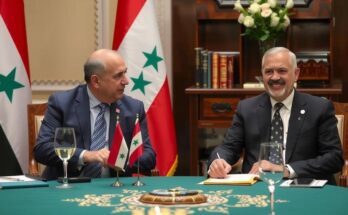A ceasefire between Hezbollah and Israel, brokered by the U.S. and France, took effect on November 27, 2024, requiring Israeli troops to withdraw from southern Lebanon by January 25, 2025. While Iran views this ceasefire positively, as it protects Hezbollah and secures its deterrent role against Israel, the upcoming Trump administration may complicate the situation further. Analysts suggest Iran will seek to maintain this ceasefire amidst heightened regional tensions, reflecting the delicate balance of power in the Middle East.
The fragile ceasefire between Hezbollah and Israel, established through the mediation of the United States and France, came into effect on November 27, 2024. This arrangement stipulates that Israeli military forces must withdraw from southern Lebanon by January 25, 2025, allowing Hezbollah to relocate its arms and facilitating the deployment of Lebanese troops supported by a UN and French military presence at the border. Prime Minister Benjamin Netanyahu has characterized this shift as a pivot towards addressing perceived Iranian threats; however, members of his right-wing coalition view the agreement as a significant mistake, arguing it jeopardizes Israel’s security interests in the region.
Iran, on the other hand, perceives the ceasefire positively, as it mitigates risks to Hezbollah, a crucial ally. Analysts suggest that Iranian influence was instrumental in persuading Hezbollah to accept the ceasefire, recognizing that further conflict could diminish Hezbollah’s capacity and weaken Tehran’s standing in the Middle East. Experts, such as Dr. Sina Azodi from the George Washington University, assert that losing Hezbollah would represent a severe blow to Iran’s regional security framework.
This ceasefire offers Iran a strategic pause, enabling it to redirect focus towards nuclear negotiations, regional military activities, and domestic challenges without the burden of a protracted conflict in Lebanon. The agreement also serves to delink the fighting in Lebanon from the broader Palestinian issue, which the Israeli government successfully navigated to mitigate Hezbollah’s influence.
Looking forward, the impending inauguration of President-elect Donald Trump potentially complicates the geopolitical landscape, as the expiration of this ceasefire coincides with renewed concerns over U.S. sanctions against Iran and increased Israeli assertiveness. Analysts anticipate that Iran will endeavor to maintain the ceasefire in the interim, particularly during Biden’s remaining term, to avoid escalated hostilities that could further endanger its interests.
Despite a temporary respite provided by the ceasefire, the underlying tensions between Iran and Israel remain palpable. With both nations maintaining high alert, further provocations or shifts in U.S. policy may rekindle hostilities, emphasizing the fragile nature of the current ceasefire and the complicated dynamics at play in the region.
The background of the Hezbollah-Israel ceasefire highlights the fragile nature of peace in the region, particularly amidst the backdrop of ongoing conflicts involving Iran and its allies. The ceasefire, negotiated primarily by the U.S. and France, aims to create stability in southern Lebanon while addressing the broader implications of such agreements for Iranian regional strategies. Iran’s support for Hezbollah has historically been rooted in maintaining a deterrent against Israel and, thus, the ceasefire presents both challenges and opportunities for Tehran amidst its complex geopolitical landscape.
In conclusion, while Iran has welcomed the Hezbollah-Israel ceasefire as a means to protect its interests in the region and maintain the viability of its ally, the uncertainties surrounding the incoming U.S. administration and its policies present new challenges. The tensions between Israel and Iran, coupled with Hezbollah’s military capacity, suggest that while the ceasefire may provide momentary relief, underlying geopolitical dynamics will continue to threaten the stability of the region. As both nations remain vigilant, the potential for renewed conflict lingers.
Original Source: www.newarab.com




